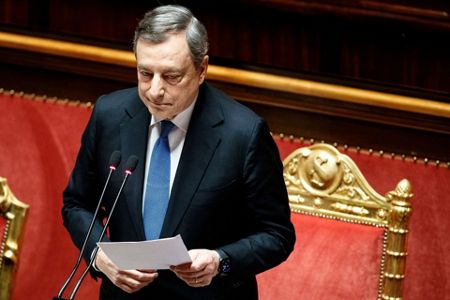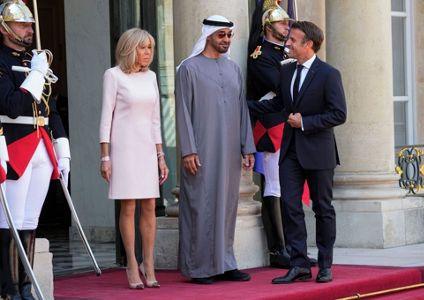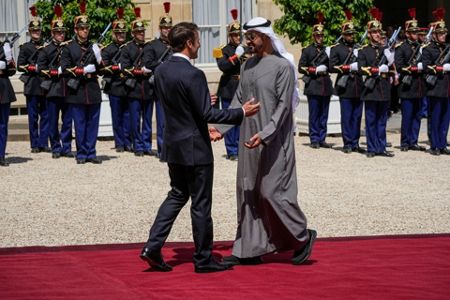ROME (AP) — European leaders ramped up their push to secure alternative energy supplies Monday as fears escalate of a complete natural gas cutoff by Russia, with the leaders of Italy, France and the European Union sealing deals with their counterparts in Algeria, Azerbaijan and the United Arab Emirates.
With his government's fate in limbo back home, Italian Premier Mario Draghi visited Algeria’s capital of Algiers, seeking to cement the North African country’s role as a preeminent regional partner. Algerian President Abdelmadjid Tebboune said a $4 billion deal would be signed Tuesday to supply “a significant quantity of gas.”
“Algeria is a very important partner for Italy, in the energy sector, in the industry and business fields, in the fight against criminality, and in the search for peace and stability in the Mediterranean,” Draghi said.
Also Monday, France and the United Arab Emirates signed an agreement on energy cooperation to ensure oil and natural gas supplies from the Gulf country. The French economy ministry didn't release details on the deal as President Emmanuel Macron hosted Sheikh Mohammed bin Zayed Al Nahyan in Paris.
The same day, EU Commission President Ursula von der Leyen was in Azerbaijan to clinch a deal with President Ilham Aliyev on increased gas supplies from the former Soviet republic.
With the tentative agreement, the EU wants to double the gas imports from Azerbaijan within half a decade. The bloc said the agreement also has guarantees for green energy supplies.
“This is good news for our supplies of gas this winter and beyond,” von der Leyen said.
Europe has been scrambling to secure alternative energy sources as Russia's war in Ukraine and Moscow's drawdown or cutoff of natural gas flows to a dozen EU countries have triggered soaring energy prices, inflation and growing expectations of a recession. The 27-nation EU now is bracing for the possibility of a complete Russian cutoff of natural gas that powers industry, generates electricity and heats homes in winter.
Leaders have been pushing to fill underground gas storage to try to avert a worsening energy crisis when the cold months arrive. There are fears a major pipeline between Russia and Germany that closed for scheduled maintenance last week will not turn back on in retaliation for sanctions over the war.
In Algeria, several Italian ministers signed a series of memos of understanding in areas ranging from pharmaceuticals, research, anti-corruption efforts, security as well as energy sectors.
“This summit also confirms Algeria as our preferred partner in the energy field. In these (last) months, Algeria has become the leading supplier of gas to our country," Draghi said.
Tebboune, the Algerian leader, said that signed Tuesday would be "an important agreement between the companies Occidental, Eni and Total for a value of $4 billion which allows the supplying of a significant quantity of gas."
He stressed his nation’s desire to ensure that Algeria will supply solar and conventional energy to Europe.
When Draghi visited Algeria three months ago, a major agreement was reached between Algerian energy giant Sonatrach and Italian energy company Eni to increase gas exports. A pipeline running through Tunisia and under the Mediterranean to Sicily is a key conduit in this strategy.
Referring to that deal, the Italian premier expressed satisfaction that there has been "an acceleration of what was predicted" for Algerian-Italian energy cooperation.
“That bodes well for more cooperation in the years to come,'' Draghi said, adding that the two nations also saw prospects for working together on renewable energy.
Such deals are “fundamental for the European Union as well as Italy,” Draghi said. Italy also has been reaching out to other energy-producing nations to secure alternate sources, including Azerbaijan, Qatar, Congo, Angola and Mozambique.
Draghi had planned to spend two days in Algeria. He reduced the visit to Monday only as his government's fate hangs in the balance after the defection last week of a key coalition member on an energy costs relief bill.
Prior to the war, Russia provided Italy about 29 billion cubic meters of gas per year, compared with about 23 billion from Algeria. Already this year, Algeria has delivered 13.9 billion cubic meters to Italy via the Trans-Mediterranean pipeline, a 113% rise over forecasts, according to Algerian energy giant Sonatrach.
Algeria on Friday announced a 4 billion cubic-meter increase in planned supplies for the months ahead.
___
Adamson reported from Paris. AP reporters Raf Casert in Brussels; Barbara Surk in Nice, France; and Masha Macpherson in Paris contributed.
Copyright 2022 The Associated Press. All rights reserved. This material may not be published, broadcast, rewritten or redistributed without permission.




